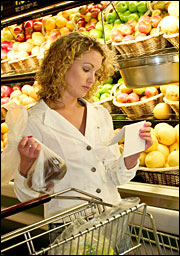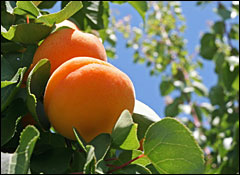Hi Umbra!
I just recently became a stay-at-home mom. Life is bliss, except for the one-income household we now have (my husband brings home the tofu-bacon). Now that we have very limited funds I cannot afford to buy all organic food. Sometimes organic food is nearly double the price of conventional food … yikes! I looked around and could not find a great website for foods you need to buy organic. I know that some conventional foods are not so pesticide-laden as others, but I’m not sure which. Could you please tell me this: if you could buy only some organic food, what should it be?
Tammi
Bailey, Colo.
Dearest Tammi,
Apologies for not explicitly providing this basic resource to dearest readers. I’ve mentioned the Environmental Working Group’s produce shopping guide, but that doesn’t help you search the Ask Umbra archives for “best organic foods.” Sorry.

Basket case.
Photo: iStockphoto
The EWG guide is designed to answer the “which food” question for fresh fruits and vegetables. EWG looked at USDA food consumption data and USDA and FDA pesticide residue tests, and developed a pesticide residue ranking from worst to best for 44 types of produce. If you have specific concerns, you may wish to read more about EWG’s methodologies — for example, common habits of peeling and washing are incorporated into the tests.
The 12 fruits and vegetables with the highest amount of pesticide residues are peaches, apples, sweet bell peppers, celery, nectarines, strawberries, cherries, lettuce, imported grapes, pears, spinach, and potatoes. These are the ones to spend your money on. The 12 with the lowest residues are onions, avocado, frozen sweet corn, pineapples, mangoes, frozen sweet peas, asparagus, kiwi, bananas, cabbage, broccoli, and eggplant. When short of cash, go ahead on conventionally grown versions of these.
The shopping guide gets us started on produce, but how about the rest of our diet? Consumer Reports has an interesting series of articles about prioritizing among organic products. Their top priorities include the produce chosen by EWG. They also believe meat, poultry, eggs, and dairy should be an organic priority because of risks including mad cow and the antibiotics and hormones used in conventional animal husbandry. Their third top priority is baby food, for reasons of small bodies and potential concentrated residues in processed purees.
I agree with these personal health priorities, in part because they correlate with larger environmental concerns. A link between pesticide residue and pesticide application seems likely, and large-scale meat production benefits only the financial bottom line.

A prime offender?
Photo: iStockphoto
The rest of the Consumer Reports list is intriguing: They say if price is no object, go ahead and buy organic grains and processed foods. However, they argue, these foods lose many nutrients and “health value” during processing, hence do not offer enough added value in their organic form to always justify the price increase. To me, making that argument from a personal-health perspective does not exempt those who can afford to buy all organic from doing so based on environmental stewardship. CR also pooh-poohs organic seafood, because no U.S. certification exists, and organic cosmetic products, based in part on another report from EWG, because they apparently are often fraudulent. Egad.
The magazine does offer a series of tips on saving money while shopping organic, including comparison shopping, comparison shopping at the farmers’ market, buying directly from livestock producers, and joining a Community Supported Agriculture program. OK — wait — it looks like I’ve never written about CSA, either. Could someone please send in a question for me to answer?
Let me just briefly add other cash-saving ideas, including forming a buying club with friends to deal directly with a food distributor, buying large bulk amounts at stores that offer a discount for so doing (my local co-op gives a 10 percent discount on 25-pound bags of rice, for example), and buying fewer animal products.
Correctively,
Umbra


